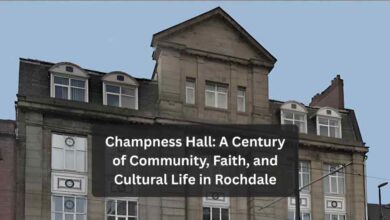Ihnji Jon: A Visionary Scholar Bridging Human Geography, Urban Ecology, and Feminist Philosophy

Ihnji Jon stands out as a compelling voice in contemporary human geography, offering a unique blend of intellectual rigour and creative insight. Her work is a rich tapestry of environmental thought, urban studies, feminist theory, and political philosophy. With a career that spans several continents and academic traditions, she brings a distinctly international perspective to questions of urban ecology, knowledge production, and the politics of identity.
Early Life and Academic Foundations
Ihnji Jon’s academic journey began with a deep curiosity about how people interact with their environments and how societies construct meaning in the spaces they inhabit. She pursued her undergraduate and postgraduate education across globally recognised institutions, shaping a profile that is both cosmopolitan and rooted in rigorous research traditions. Her master’s degree from Sciences Po in Paris provided a strong grounding in international affairs and political theory, while her doctoral work at the University of Washington in Seattle enabled her to focus on the intersections of urban space, environmental planning, and social identity. These formative years instilled in her an appreciation of cross-cultural perspectives and the importance of critically examining the relationship between place and politics.
Professional Career and Teaching Roles
Before joining Cardiff University as a Lecturer in Human Geography, Ihnji Jon gained valuable experience across several leading academic environments. Her time at the University of Melbourne as a Lecturer in International Urban Politics broadened her understanding of global urban transformations and the varied approaches to environmental governance. She also held a prestigious Chateaubriand Fellowship at the École Normale Supérieure in Paris, further sharpening her engagement with European traditions of critical theory and urban studies. These international experiences have allowed her to develop a teaching style that is both intellectually challenging and deeply inclusive, inspiring students to approach geography as a living discipline that can address real-world problems.
Core Research Interests
Ihnji Jon’s scholarship is marked by an ability to weave together diverse strands of inquiry into a coherent and thought-provoking framework. Among her central research interests are the politics of green urban development, the spatial implications of circular economy initiatives, and the role of knowledge in shaping environmental and social change. She examines how cities can respond to ecological crises not simply through technical solutions, but by re-imagining relationships between humans and the more-than-human world. Her work highlights the importance of understanding how knowledge is created, contested, and deployed, especially when it comes to questions of identity, culture, and environmental justice.
Feminist Relational Approaches
One of the most striking features of Ihnji Jon’s work is her commitment to feminist relational approaches in geography and political philosophy. Rather than seeing identity as fixed or bounded, she emphasises the fluid and interconnected nature of social and ecological relationships. This perspective challenges traditional notions of political boundaries and invites us to think about cities, communities, and ecosystems as dynamic networks of mutual influence. Her research underscores the value of care, empathy, and interdependence, encouraging a rethinking of how urban environments can be planned and governed to promote equity and sustainability.
Urban Political Ecology and the Anthropocene
In an age defined by the Anthropocene—the era in which human activity is the dominant force shaping the planet’s climate and ecosystems—Ihnji Jon’s work on urban political ecology is particularly timely. She interrogates how cities both contribute to and are affected by ecological transformations, and she explores how urban spaces can become laboratories for sustainable living. By investigating the politics of green redevelopment and the social consequences of circular economies, she provides a nuanced understanding of how environmental policies intersect with issues of class, race, and identity. Her analyses reveal the complexities of creating cities that are not only environmentally resilient but also socially just.
Knowledge, Power, and Environmental Justice
Central to Ihnji Jon’s research is the question of whose knowledge counts in the making of environmental policy. She examines how power dynamics influence the production and circulation of knowledge, and how certain voices are amplified while others are marginalised. This critical perspective is vital in a world where environmental decisions often have profound impacts on vulnerable communities. By bringing attention to the politics of knowledge-making, she encourages a more democratic and inclusive approach to environmental planning and governance.
Contributions to Academic Literature
Ihnji Jon has contributed significantly to academic literature in human geography and urban studies. Her book Cities in the Anthropocene: New Ecology and Urban Politics is a landmark exploration of how cities can act as agents of ecological transformation. In this work, she combines theoretical insight with empirical research to show how urban spaces can be reimagined as sites of ecological care and innovation. Her numerous journal articles further elaborate on themes such as the challenges of green redevelopment, the intersection of environmental policy and social identity, and the possibilities of feminist ecological politics. These publications have positioned her as a leading thinker in the ongoing conversation about how societies can respond to climate change and environmental degradation.
Teaching Philosophy and Student Engagement
As an educator, Ihnji Jon is known for her dynamic and interactive teaching style. She believes that learning should be a collaborative process, where students are encouraged to question assumptions and develop their own critical perspectives. Her courses often integrate real-world case studies, fostering a learning environment that bridges theory and practice. By mentoring students from diverse backgrounds, she helps cultivate the next generation of scholars and practitioners who will address the pressing environmental and social challenges of our time.
Global Perspective and Interdisciplinary Reach
Ihnji Jon’s career reflects a global outlook and an interdisciplinary mindset. Having lived and worked in North America, Europe, and Australia, she brings a rich diversity of perspectives to her research and teaching. Her ability to draw connections between political philosophy, feminist theory, environmental science, and urban planning demonstrates the power of interdisciplinary thinking. This breadth allows her to speak to multiple audiences, from policymakers and activists to academics and students, making her work both accessible and impactful.
Influence on Policy and Public Debate
Beyond academia, Ihnji Jon’s insights have implications for policy and public debate. Her analyses of circular economies and green urban development inform strategies for creating sustainable cities. By highlighting the need to integrate social justice with environmental policy, she provides guidance for governments, NGOs, and community organisations seeking to create inclusive and equitable responses to climate change. Her work encourages decision-makers to consider not only technical solutions but also the cultural and political dimensions of environmental planning.
Future Directions and Emerging Questions
As environmental crises deepen and urban populations continue to grow, the relevance of Ihnji Jon’s work will only increase. Future research may explore how digital technologies and data science intersect with urban ecological planning, or how communities can build resilience in the face of climate shocks. Her commitment to feminist relational approaches suggests that she will continue to challenge dominant paradigms and propose innovative frameworks for understanding the complex relationships between humans and their environments.
Legacy and Continuing Impact
Ihnji Jon’s career is a testament to the power of interdisciplinary scholarship and the importance of critical, inclusive thinking. She has already made significant contributions to the fields of human geography and urban ecology, and her influence is likely to grow as new generations of scholars and practitioners draw inspiration from her work. By insisting on the integration of feminist philosophy, environmental justice, and urban planning, she has helped shape a more holistic understanding of how cities and societies can thrive in an era of ecological uncertainty.
Conclusion
Ihnji Jon embodies the qualities of a twenty-first century scholar: intellectually adventurous, globally minded, and deeply committed to social and environmental justice. Her research challenges us to rethink the way we understand cities, knowledge, and our relationship with the natural world. Through her teaching, writing, and public engagement, she offers a vision of human geography that is not only academically rigorous but also profoundly relevant to the challenges of our time. For anyone seeking to understand how cities can navigate the complexities of the Anthropocene while promoting equity and sustainability, the work of Ihnji Jon provides both inspiration and guidance.



